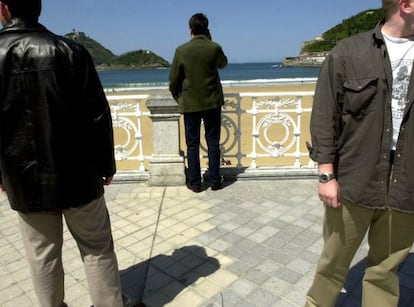Ministry to cut bodyguard protection to minimum levels as ETA threat recedes
Protection will gradually be withdrawn from more than 1,500 public figures, saving millions of euros

The Spanish Interior Ministry says that it is to begin withdrawing armed protection for senior members of the former Socialist Party administration, along with that given to other public figures and journalists. The announcement reflects confidence that Basque terrorist organization ETA no longer represents a threat, and will see some 200 police bodyguards and around 30 vehicles return to normal duties.
When Popular Party Prime Minister Mariano Rajoy took office in late 2011, more than 1,600 officials were under police protection. In most other European countries, that figure is usually around 30, and applies only to senior members of government and other institutional posts.
Withdrawing the 424 bodyguards assigned to Basque Country and Navarre politicians saved €3.8m a year
In March 2012, the secretary of state for security said that “given the ostensible reduction in the threat from ETA,” it would be cutting back on the number of bodyguards, a process that has gradually been underway since.
The measures have seen lists drawn up of public figures seen as no longer requiring protection, as well as establishing different risk levels, and new criteria that would allow bodyguards to be removed from former office holders, and to remove protection during vacations or periods spent abroad.
In the first phase, the Interior Ministry withdrew the 424 private bodyguards assigned to politicians in the Basque Country and Navarre, saving the state €3.8 million a year, as well as allowing those officers to be used for other activities.
In July 2012, the Interior Ministry stopped using what it called dynamic protection, officers who accompanied public figures at all times. This freed up 646 police officers for other duties.
The government is convinced ETA will not resume its campaign of killing, kidnappings and extortion
On October 20, 2011 ETA announced the “definitive end to its armed activity”. While the armed group has yet to hand over its weapons, and has not yet formally dissolved, the government says that it is fully convinced that ETA will not resume its campaign of bombings, kidnappings, shootings and extortion in pursuit of an independent Basque homeland.
There are still many senior figures from the Socialist Party government of former prime minister José Luis Rodríguez Zapatero – in power between 2004 and 2011 – who are protected at a cost to the public purse.
Secretary of State Francisco Martínez tasked a team of experts to carryout a case-by-case study of individuals who might still be considered at risk, and who have been assigned bodyguards. The conclusion that that in the majority of cases, the risk level was “low or very low.” Over the years, there have also been several cases where people have refused police protection.
Many feel a weight has been lifted when they no longer need bodyguards”
From September, bodyguards will be assigned to the prime minister, deputy prime minister, the heads of Congress, the Senate, and the Constitutional and Supreme Courts, as well as the head of the Office of Public Prosecutions, the heads of the main judicial organs, government representatives in the regions, and the secretaries of state for security and defense. When the men and women holding these positions are replaced, they usually retain protection for one or two years, depending on the risk analysis established by the experts.
Protection for the royal family is carried out by the Royal Household, and is not the Interior Ministry’s responsibility.
“Many people feel that a great weight has been lifted from their shoulders when they no longer need bodyguards, particularly public office holders in the Basque Country, many of whom have been under protection for decades,” says one senior police officer.
Two years ago, Luis del Olmo, a veteran journalist, told Jorge Fernández, the then-interior minister, during a radio interview: “You know that ETA has tried to kill me seven times. If they have all failed, it is because of the bodyguards that you assigned me. I have had a bodyguard for 30 years. But as it seems that ETA is no longer interested in killing anybody at the moment, I am asking you formally to withdraw my bodyguard.” During the same interview, Fernández said that withdrawing protection would save the state some €16 million.
But the plans have run into opposition from some of those who currently enjoy police protection. “There are some who believe that by having a bodyguard they are in some way setting themselves apart from the rest of society. Obviously, this is not an argument that makes any sense,” says the same police source.
Tu suscripción se está usando en otro dispositivo
¿Quieres añadir otro usuario a tu suscripción?
Si continúas leyendo en este dispositivo, no se podrá leer en el otro.
FlechaTu suscripción se está usando en otro dispositivo y solo puedes acceder a EL PAÍS desde un dispositivo a la vez.
Si quieres compartir tu cuenta, cambia tu suscripción a la modalidad Premium, así podrás añadir otro usuario. Cada uno accederá con su propia cuenta de email, lo que os permitirá personalizar vuestra experiencia en EL PAÍS.
¿Tienes una suscripción de empresa? Accede aquí para contratar más cuentas.
En el caso de no saber quién está usando tu cuenta, te recomendamos cambiar tu contraseña aquí.
Si decides continuar compartiendo tu cuenta, este mensaje se mostrará en tu dispositivo y en el de la otra persona que está usando tu cuenta de forma indefinida, afectando a tu experiencia de lectura. Puedes consultar aquí los términos y condiciones de la suscripción digital.








































